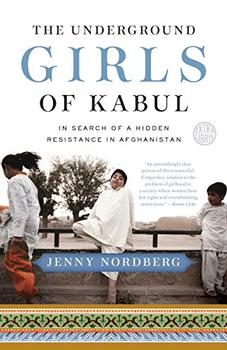Summary | Excerpt | Reading Guide | Discuss | Reviews | Beyond the Book | Readalikes | Genres & Themes | Author Bio

In Search of a Hidden Resistance in Afghanistan
by Jenny Nordberg
Benafsha comes alive at my side, seeing the chance to finally prove her point. She waves her arms to call her brother's attention: "Tell her, Mehran. Tell her you are our sister."
The corners of Mehran's mouth turn downward. He sticks his tongue out in a grimace before bolting, almost crashing into his mother as she walks into the room.
Azita's eyes are lined with black kohl, and she wears a little bit of blush. Or perhaps it is the effect of having had a cell phone pressed to her ear. She is ready now, she exclaims in my direction. To tell me what I came to ask about—what it is like, almost a decade into America's longest war and one of the largest foreign aid efforts of a generation, to be an Afghan woman here.
When we first meet, on this day, I am researching a television piece on Afghan women and Azita has been a member of the country's fairly new parliament for four years. Elected to the Wolesi Jirga, one of the legislative branches installed a few years after the 2001 defeat of the Taliban, she had promised her rural voters in Badghis province that she would direct more of the foreign aid influx to their poor, far-flung corner of Afghanistan.
The parliament she entered was heavily populated with drug kingpins and warlords and seemed to be in a state of paralysis due to deeply entrenched corruption, but it was at least an attempt at democracy that many Afghans expressed hope for. It followed many forms of failed governance during the last century: absolute monarchy, communism, and an Islamic emirate under the Taliban. Or no government at all in times of civil war.
As some foreign diplomats and aid workers around Kabul came to know Azita as an educated female parliamentarian who not only spoke Dari, Pashto, Urdu, and Russian, but also English, and who seemed relatively liberal, invitations to events poured in from the outside world. She was flown to several European countries and to Yale University in the United States, where she spoke of life under the Taliban.
It was not unusual for Azita to invite foreigners to her rented home in Macroyan, either, to show her version of normal life in a Kabul neighborhood. Here, laundry flutters on the balconies of dirt-gray four-story buildings, interrupted by the occasional patch of greenery, and in the early mornings, women gather at the hole-in-the-wall bakeries while men perform stiff gymnastic exercises on the football field. Azita takes pride in being a host and showing herself off as an exception to the way Afghan women are portrayed in the outside world—as secluded inside their homes, with little connection to society, often illiterate and under the spell of demonizing husbands who do not allow them any daylight. And definitely not receiving visits from farangee, or foreigners, as the historical invaders were once dubbed by Afghans. These days, foreigners usually go under amrican, regardless of their passport.
Azita enjoys demonstrating her running water, the electricity, the television set in her bedroom; all paid for with money she has made as the breadwinner of the house. She knows that impresses foreigners. Especially female foreigners. With her glowing cheeks, sharp features, and military-grade posture, elegantly draped in black fabric from head to toe, and exuding a warm scent of musk mixed with something sweet, Azita does look different from Afghanistan's majority of women. At five feet six—perhaps a little taller in her pointy size-eleven sling-back heels—she even towers over some visitors.
Those usually arrive in more practical shoes, as if on a trek somewhere.
On the topic of progress for women since 2001, Azita expresses little satisfaction to visiting foreigners, of which I am just the latest: Yes, more women are seen on the streets of Kabul and a few other larger cities than when the Taliban was in power, and more girls are enrolled in school, but just as in earlier eras when reforms were attempted, most progress for women is limited to the capital and a handful of other urban areas. Much of what the Taliban had banned and decreed regarding women is still effectively law in large parts of this mostly illiterate country, enforced by conservative tradition. In many provinces, burkas are still commonplace, and women rarely work or leave the house without their husbands. The majority of marriages are still forced, honor killings are not unusual, and any involvement of the justice system in a rape case usually means that only the victim goes to jail, charged with adultery or with having had premarital sex—unless she, as a commonly imposed solution, is forced to marry her rapist. Women burn themselves to death using cooking fuel to escape domestic abuse here, and daughters are still a viable, informal currency used by fathers to pay off debts and settle disputes.
Excerpted from The Underground Girls of Kabul by Jenny Nordberg. Copyright © 2014 by Jenny Nordberg. Excerpted by permission of Crown. All rights reserved. No part of this excerpt may be reproduced or reprinted without permission in writing from the publisher.
Your guide toexceptional books
BookBrowse seeks out and recommends the best in contemporary fiction and nonfiction—books that not only engage and entertain but also deepen our understanding of ourselves and the world around us.